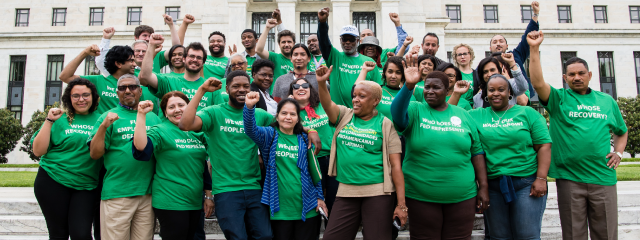Blog
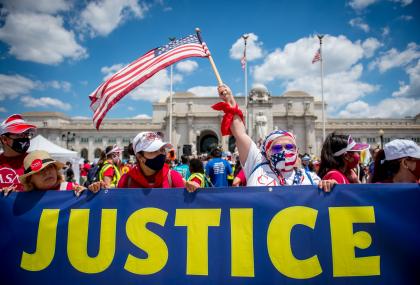
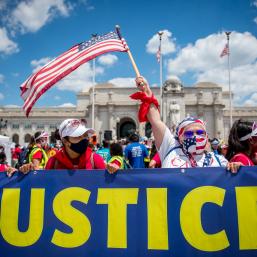
This summer, we have the opportunity to influence crucial policy decisions that could impact the lives of hundreds of thousands of workers and families across the country. As the House and Senate creep closer to their summer recess, it’s all hands on deck to make sure critical legislation is passed to ensure justice and dignity for our communities across the country.
We kicked off a summer of action on June 24 with a powerful and clear mandate: WE CAN’T WAIT for lasting, impactful progressive change. We showed up for workers and families by marching through the streets, and we demanded change by emailing members of Congress to support our ambitious, progressive agenda.
✅ Create a path to citizenship for 11 million undocumented immigrants.
✅ Invest in green infrastructure.
✅ Build permanent care systems, providing quality, affordable care for everyone.
✅ Fix the broken unemployment system, and invest in good jobs.
This is just the beginning. We need to keep up the momentum and show Congress that we won’t back down. Help us continue to show up for workers and families, and fight for the protections and benefits they need and deserve this summer and beyond by contacting your representatives today →
Leading up to the summer, CPD and our affiliates were instrumental in securing $7B for health worker jobs, $100M for BIPOC-owned small businesses, and $30M for harm reduction in the American Rescue Plan. In New York, CPD affiliates Make the Road New York and New York Communities for Change won a groundbreaking $2.1B for excluded workers, $2.4B in emergency rental assistance, and a tax increase on the ultra wealthy to fund public education and other critical services. While these victories are powerful strides to pursuing our bold agenda, we know there is still work to be done.
The fight is just heating up! This is an historic moment where we have an opportunity to pass legislation that will impact our community members for decades. We must continue to fight alongside activists for citizenship for all, affordable healthcare, stronger unemployment insurance, good jobs, and so much more – and we’ll have plenty of opportunities for all of us to show up between now and September. Our workers and families are counting on us, but we can’t do it without your support. Will you contact your Senator and ask that they support our efforts this summer and beyond? Contact your senator now!
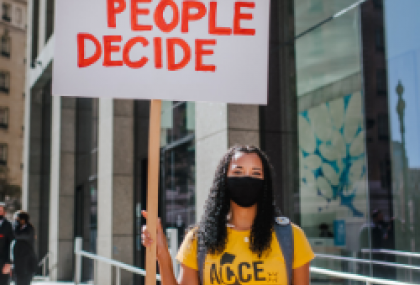
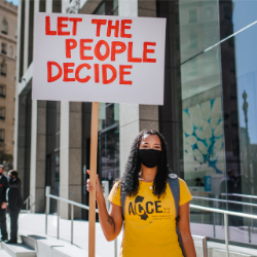
Strategic research, policy, and legal expertise are critical components to advancing national and local campaigns in communities across the country. From highlighting the experiences of our communities to identifying policy solutions to reverse historic inequities, strategic research can help facilitate the organizing and action needed to win real change.
At CPD, we’re always thinking about how to make our democracy stronger and more accessible. In the last several months, we’ve worked with a coalition to launch Democracy Beyond Elections, a participatory policy making model that focuses explicitly on ways that community members can inform and decide on policy. More specifically, it creates a process that invites community members to identify, develop, and decide directly on policy proposals. Participatory policy making helps build mutual trust between communities and government, and expand public power over decisions. You can learn more about this initiative here.
Most recently at the local level, we partnered with the Connecticut Recovery For All Coalition which includes CPD affiliate Make the Road CT, to release the case for robust public investment in Connecticut after billionaires amassed $12.6 Billion in new wealth during the pandemic. At the national level, we released a policy memo about transforming America’s unemployment insurance system, followed by a larger report on reforming unemployment insurance to lay the foundation for equity, and a position paper on how the Biden administration can challenge the Federal Reserve’s leadership to embrace growth and equity. This month, we published a brief on key progressive revenue-generating policies for states to ensure corporations and the ultra wealthy pay their fair share, and an analysis of diversity in Federal Reserve leadership, the most powerful economic policy institution in our country.
To say we’ve been busy is an understatement. You can read more about each of these issues and many others here.
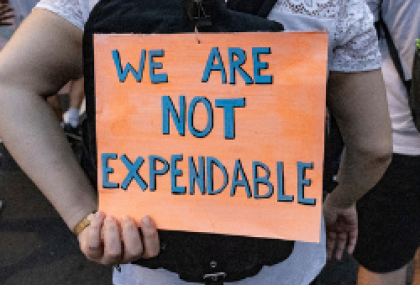
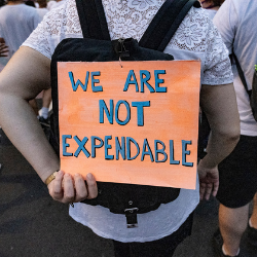
Nearly 40 million people were left unemployed after COVID-19 struck in 2020. If we don’t make bold changes to our nation’s economic and social foundation now, we could squander our best chance to save our economy from tanking in the next decade. Last summer, organizers across our network quickly mobilized and launched Unemployed Action, a space for unemployed workers to fight for their needs. This group fought for and won continued unemployment relief throughout the pandemic and most recently in the American Rescue Plan. Right now, Unemployed Action is turning it’s focus to a #FixUI campaign and coalition to permanently reform unemployment insurance (UI).
Through Unemployed Action, worker-led committees mobilized a growing base of more than 16,000 people from across the country to take action, including phone-banking, peer-to-peer texting, and organizing local protests. Dozens of new activists have built their skills through collective struggle, shared their stories, and participated in spokespeople trainings. Even as millions of families - mostly people of color - face a premature end to federal unemployment benefits, Unemployed Action continues to build community through mutual aid. The fights for continued relief and weekly organizing meetings have primed members for broader economic justice campaigns, including the fight to raise the minimum wage, win paid leave for all, and transformational overhaul of our broken UI system.
Together with CPD affiliates, Unemployed Action built a #FixUI national coalition that includes affiliates like New Georgia Project, Step Up Louisiana, Detroit Action, Make the Road Nevada, Working Washington, and Ohio Organizing Collaborative, as well as national advocacy organizations and union allies. Most recently, CPD led an innovative policy development process in which unemployed activists engaged deeply with policy experts, researchers and economists to develop an ambitious set of reforms grounded in unemployed workers’ lived experiences. This month, we published a groundbreaking report, Reforming Unemployment Insurance: Stabilizing a system in crisis and laying the foundation for equity, with allies the Center for American Progress (CAP), the Economic Policy Institute (EPI), the Groundwork Collaborative, National Employment Law Project (NELP), the National Women’s Law Center, and the Washington Center for Equitable Growth.
Twenty six states have moved to cut pandemic benefits early and more may follow suit, highlighting the urgency of establishing federal standards for unemployment benefit amounts and eligibility standards. The enormous geographic and racial inequality within our unemployment system calls out for Congressional intervention.
On June 24th, Unemployed Action and CPD affiliates mobilized members across the country for our #WECANTWAIT Day of Action. Outside of D.C., we held rallies in Austin, TX; New Orleans, LA; Los Angeles, CA; Atlanta, GA to demand legislators #FixUI. Hundreds shared their stories of unemployment and communicated their demands for unemployment insurance reform and relief. Several Congressional offices responded immediately on social media indicating their support for our demands.
As we approach the pandemic unemployment benefits cutoff date of September 6, we will continue to apply concentrated pressure on key offices to push unemployment reform as part of the next reconciliation package. Unemployed Action will continue to build their internal organizing structure to mobilize and expand their base and could use your support! Take 2 minutes to sign this petition and share your story, or share the story form with someone you know who is unemployed. With your help, we’ll continue to empower our leaders to develop their organizing skills to build power in their communities and across the country to demand an equitable economic recovery.
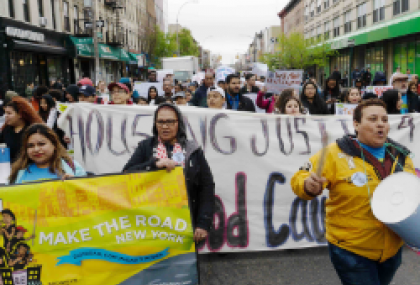
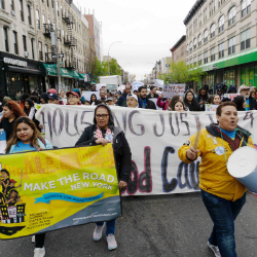
CPD network affiliates have been in the streets, organizing, rallying and lobbying since the pandemic began to keep their members in their homes and neighborhoods. So many of CPD affiliate members have experienced housing insecurity before and during the pandemic, and have been able to win significant victories for eviction protections at the local, state, and federal level; to cancel rent and mortgage debt; and for an unprecedented federal investment of millions of dollars of rent relief regardless of immigration status.
The Biden administration extended the CDC National Eviction Moratorium by only one month until July 31. The moratorium and extension does not go nearly far enough to protect families who are at risk of losing their homes due to our government’s failure to provide relief for working families and communities during the pandemic. More than 7 million tenants are currently behind on their rent and at risk of eviction when the CDC Eviction Moratorium expires in July — with no national and few local protections for renters.
CPD affiliates recently rallied to call on Congress and the Biden administration to pass universal protections against eviction and more time for rent relief to reach communities, and for a long-term transformation of the housing system so housing is decommodified. Leaders from Arkansas Community Organization, New York Communities for Change, Make the Road Nevada, Make the Road Pennsylvania, ACCE, and Detroit Action shared the need for continuing eviction protections to prevent mass homelessness and to unite and fight for deep investment in communities for housing and racial justice.
Over the last year, our affiliates won 20 groundbreaking housing policy wins, including eviction moratorium and strengthened renter protections in 11 states covering 47 million renters, and directly impacting over 17 million people who were at risk of eviction during the COVID-19 pandemic. These victories were won from renters organizing grassroots eviction defense networks and building a national movement to cancel rent and protect tenants against evictions. CPD affiliates have been organizing to protect their communities in the short-term as well as looking forward to transforming our housing system so we all have a Home to Thrive. To support this critical work, please sign and share our petition to protect the 7 million renters at risk of eviction on July 31, and to join our fight by liking Renters Rising on Facebook and Instagram.
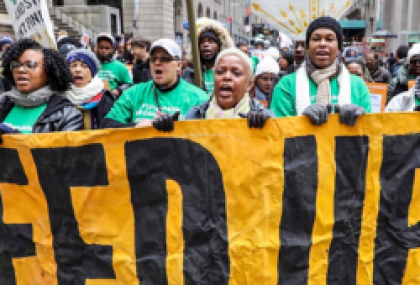
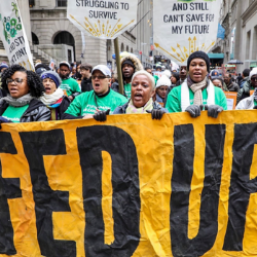
How many people should be unemployed? Do we want wages for working people to be rising? Should we end the racial employment gap that means Black workers will no longer be unemployed at twice the rate of the rest of the country?
Twelve leaders of the Federal Reserve – our country’s central bank – meet every six weeks to decide on these exact questions. The Federal Reserve (the Fed) is the most important economic policy institution in the country, and yet it hides in plain sight by shrouding its work in secrecy and jargon. Grassroots activists and the progressive movement have mostly ignored the Federal Reserve, but Wall Street hasn’t and they’ve usually made sure that Federal Reserve policy backs Wall Street’s interest over Main Street’s.
Now it’s past time for the twelve people in that room to listen to the interests or working people. We want Federal Reserve policy to drive a pro-employment economy. The Federal Reserve can help ensure that everyone who wants to work can find a job, that wages for working people are rising, and that the racial unemployment gap is shrinking.
CPD’s Fed Up Campaign directly targets the Federal Reserve by combining strategic grassroots organizing, high-impact communications, and a clear understanding of the inflection points in the Federal Reserve’s authority. As a national campaign with local contexts, we build and organize our affiliates’ grassroots base to target the most powerful economic policymakers in the country—who are, nonetheless, accessible and moveable.
In the next twelve months we will be fighting for an ambitious, progressive agenda for the Federal Reserve.
-
We’re laying out a comprehensive progressive policy agenda for the Federal Reserve.
-
We’re targeting President Biden to hold him accountable for the Fed leaders that he appoints, including the decision he must make to appoint a new Chair of the Federal Reserve.
-
We’re working with grassroots CPD affiliate groups in six cities around the country to target the local Federal Reserve Bank in their region to win leadership change.
Although Federal Reserve policy is often obscured from the public, we are leveraging the high-profile decision of Fed Chair Jerome Powell’s reappointment and nominations to fill vacant Fed Governor seats to build public awareness and engagement. Fed Up will mobilize all of our tools and strategies—local grassroots organizing, national digital mobilizing, strategic national communications and advocacy, tactical coalition building—to win appointees in greater alignment with working people’s interests and a policy agenda for a Fed that supports a pro-employment economy.
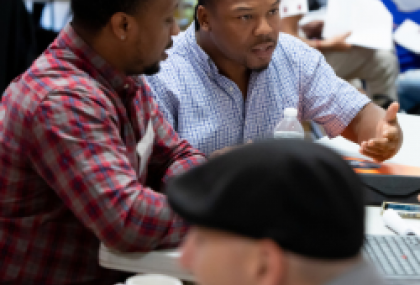
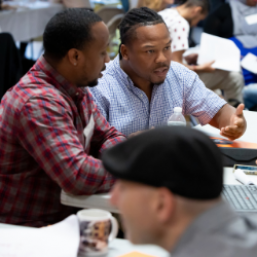
CPD’s network of affiliates are proof that strong movement organizations can win transformational change. Creating a strong base is key to our work and CPD’s national base-building program, staffed by skilled trainers, coaches, organizers, field outreach experts, and campaigners, dedicate themselves to supporting and strengthening each and every affiliate.
Recently, we have been working closely with affiliates to cultivate and co-create training opportunities that cater to the communities they are working with. This includes building leadership pipelines through a Member Leadership Academy (MLA), offering community members of CPD’s affiliates the opportunity for training and development in community organizing. This project includes building a tailored curriculum for CPD affiliates' local communities. For example, CPD collaborated with Rights and Democracy (RAD) in creating a fellowship program where organizers from RAD and CPD adapted curriculum from the MLA and co-facilitated workshops for over a dozen participants every week for ten weeks. RAD members graduated from this training with a deeper understanding of power, racial capitalism, mass incarceration, and built foundational organizing skills on outreach, recruitment, mobilization, action planning, and more.
The majority of MLA graduates have maintained or increased their participation with their affiliates and their campaigns. Strengthening participants’ analysis and organizing skills created a pivotal change in the way participants view the world and how they organize in their communities. For example, Shannon, from Unemployed Action, shared with us that she will always use one for the tool in our organizing curriculum, “The Root Cause Tree of Racial Capitalism,” when she talks with others about the issues her community is facing. Training and opportunities like the MLA help our affiliates to deepen their bench and allow organizers to improve their performance with new skills, strategies, systems, and practices. We are excited to build out and expand these programs!
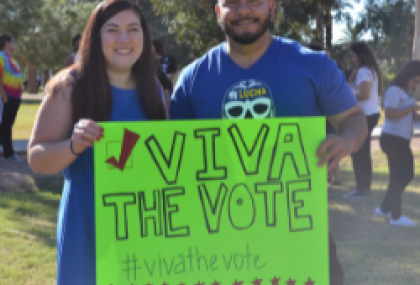
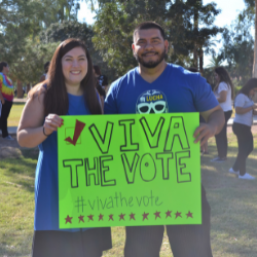
This June, ProGov21, a progressive policy project of COWS at the University of Wisconsin-Madison, is featuring CPD’s work on voting rights on their website and media platforms. In preparation for the feature, Alexis Econie, a PhD student, and Walker Kahn, a JD/PhD candidate, both in the Department of Sociology at UW-Madison, interviewed Ría Thompson-Washington and Matthew Duffy from CPD’s Voting Rights & Democracy team for ProGov21’s monthly podcast.
ProGov21 is a shared resource for progressive policymakers and advocates at the state and local levels. The project includes a free digital archive of innovative progressive laws and practices used throughout the US, along with toolkits for their effective communication and advocacy. Hundreds of organizations have contributed documents comprising an archive of thousands of progressive policy briefs, laws, acts, amendments, and other reports. ProGov21 provides twenty-seven policy roadmap areas, which serve as an introduction to the materials in the database for each policy area.
Each month, they feature one contributing organization. This month's featured roadmap addresses voting rights and CPD is their featured contributor. They are highlighting our document, Expanding Voter Registration in Cities and Counties: A Toolkit for Local Policymakers, which ProGov21 maintains in their database. Through their overall mission and by featuring important contributors on a monthly basis, ProGov21 hopes to highlight an array of progressive organizations and build connections among them.
Their interview with Matt and Ría was posted on their website in June.
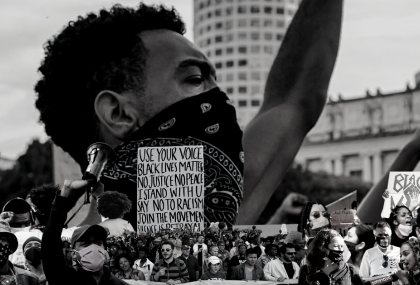
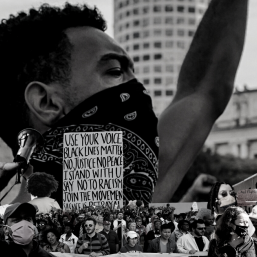
Yesterday was a powerful day for racial justice. The House Judiciary Committee reviewed the Immigration No Ban Act, and there were historic hearings in Congress held for the Self-Determination Act to move towards decolonization of Puerto Rico, and H.R. 40 For Study and Proposals for Reparations for African Americans.
We are in the midst of mourning and protesting the murder of Daunte Wright, the ongoing trial of Derek Chauvin as we relive the trauma of George Floyd’s lynching, continued efforts across states to suppress the voice and power of Black and Brown voters, and the spectacle made of Black life through the recurring videos replaying our slain bodies on the news on social media. This is all no different from early 20th century postcards of lynchings of Black people.
A reconciliation is beyond due. Today and beyond, we have an opportunity to truly move towards a democracy rooted in equity and liberation.
Black people in this country are being harmed as we speak. We cannot build equity without dismantling the past and present violence as well as the strategic harm by the government towards Black people in this country. We thank Rep. Sheila Jackson Lee for leading the charge in the House of Representatives Judiciary Committee towards America paying what is owed for the labor, blood, violence and systemic practice of disenfranchisement of Black people in America. The first time ever, a bill to study reparations is headed to the House for a vote.
The roots of anti-Black racism in this country impacts the oppression of all people without proximity to whiteness. The liberation of Black people is bound to our collective liberation. We support reparations now, because justice cannot wait.
If you’re interested in learning more, you can watch the hearing on H.R. 40 here.
#HR40 #Reparationsnow #paywhatisowed
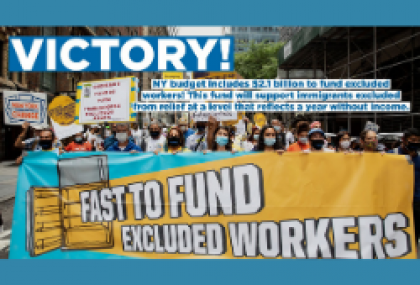
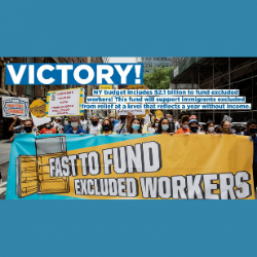
We are celebrating a huge victory in New York this week! After a year-long fight that culminated in a 23-day hunger strike led by the members of CPD's affiliates Make the Road New York (MRNY), New York Communities for Change (NYCC), and with support from members of CUFFH the New York State legislature agreed to create a $2.1 billion fund for workers previously excluded from pandemic-related benefits. This is the first fund of its kind in the history of the United States.
With this fund, New York State will provide between $3,000 and $15,000 survival checks to 200,000 excluded workers, including undocumented immigrants. MRNY, NYCC and partners staged beautiful actions, lifted up and centered the stories of real people, and didn't back down in the face of steep opposition. We hope this kind of fund becomes a model for other states and we support Make the Road New Jersey (MRNJ) and the brave workers in New Jersey who have launched a hunger strike for relief.
Our network is also pushing the federal government on immigrant inclusion. Last month, our effort for immigrant justice went big – billboard sized! The Center for Popular Democracy joined Make the Road New York, CASA, LUCHA and the National Korean American Service & Education Consortium (NAKASEC) to launch billboards that call on key senators to create a pathway to citizenship for essential workers. The billboards, along with local ads in Sunday newspapers and a push for CPD supporters to call the White House, were part of a larger targeted campaign to pressure Congress and the Biden administration to ensure that the country’s recovery is fair and equitable and recognize the innumerable contributions immigrants have made throughout the COVID-19 pandemic to keep the country running. It’s long past due to address the needs of immigrant communities and pass legislation that honors their contributions during this time of crisis. You can take action by contacting your elected official now and demand they support citizenship for essential workers in the next reconciliation package.
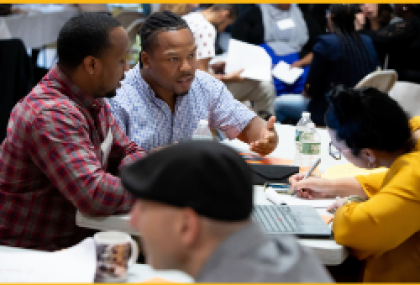
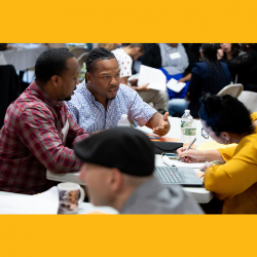
Strategic research, policy and legal expertise are critical components to advancing both CPD-driven national campaigns and local affiliate-driven campaigns in communities across the country. From highlighting the experiences of our communities to identifying policy solutions to reverse historic inequities, strategic research can facilitate the organizing and action needed to win real change.
Most recently, we partnered with CPD affiliates to release an aggregate community impact survey that explores how the COVID-19 pandemic is impacting immigrant families in New York, New Jersey, Connecticut, Pennsylvania, Nevada, and North Carolina, a policy brief that explains how we can successfully cancel rent and mortgages, and a local community impact survey that details how Connecticut’s Latinx and immigrant communities are being hit hard by the COVID-19 pandemic. You can read more about each of these issues and many others here.
In addition to physical research outputs, we are working with our affiliates to enhance strategic research across the network. At the start of the year, CPD’s team of researchers launched a facilitated learning community that brings together affiliate staff from across our network who conduct research as part of their work. From Delaware to Texas, Montana to Vermont, these network leaders represent researchers with years of experience doing strategic research to organizers who are new to research who come together to build community and skills through training and discussions. At least once a month, these minds convene discussions around survey development, analyzing and administering survey data, using large public databases, power mapping, and much more.



